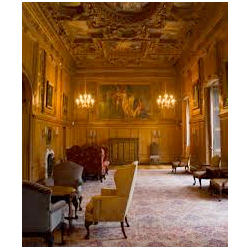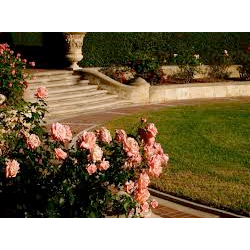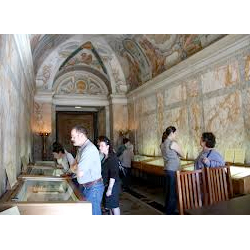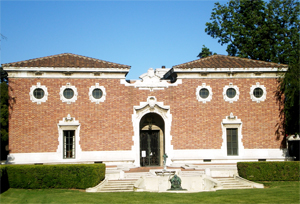A Brief History Of the Clark Library
- Details
- Category: Our History
- Published on Friday, 11 September 2009 00:09
- Written by Bruce Whiteman
The Clark was founded by William Andrews Clark, Jr. (1877-1934), the son of a wealthy miner who was one of the so-called “copper kings” and among the richest men in the trans-Mississippi West.
Junior (as the Clark staff refers to him) was born in Butte, Montana but sent as a child to France to live with relatives. He learned to speak French fluently, and as a result was a lifelong Francophile. After he returned to the United States to go to school, Clark eventually took a law degree at the University of Virginia, where he developed a love for Edgar Allan Poe, who also attended the University. Clark went to Montana to start his law practice in 1900, but he apparently tired of the law relatively quickly, and soon moved to Los Angeles where he bought a house that used to stand on the west side of the current Clark property. (The address was actually on Adams Boulevard, and was only later moved to the Cimarron Street side.) Over the ensuing twenty years, he gradually bought up other houses on the block and tore them down, until by the end of the 1920s his property consisted of a block of almost five acres. The one house that remains, which is called the Gate House, was actually moved from the middle of 25th Street to the northwest corner. Clark saved it to house staff, gardening equipment and the like.
 William Andrews Clark, Jr. was married twice and had one son. His first wife died in childbirth, and Clark’s move to California came shortly after he married his second wife. She died of cancer in 1918, and it was around that time that Clark began seriously to collect books. Most of Clark’s book bills have been saved, and apart from one rather long one dating from 1911, most of the books were acquired in 1918 and later. Why Clark became a serious bibliophile is something of a mystery, although his brother Charles who was a major collector, no doubt influenced him.
William Andrews Clark, Jr. was married twice and had one son. His first wife died in childbirth, and Clark’s move to California came shortly after he married his second wife. She died of cancer in 1918, and it was around that time that Clark began seriously to collect books. Most of Clark’s book bills have been saved, and apart from one rather long one dating from 1911, most of the books were acquired in 1918 and later. Why Clark became a serious bibliophile is something of a mystery, although his brother Charles who was a major collector, no doubt influenced him.
Clark did not remarry, and his son, William Andrews Clark III (Tertius to the family) died in an airplane crash in 1932. There are therefore no direct descendants alive today, although the Library is in touchwith somewhat more distant relatives and associates. Clark was collecting his rare books during a frenzied and exciting period for American book collectors.
Beginning with a big bang in 1911-12 at the sale of the collection of Robert Hoe, a New York bibliophile, where Henry Huntington bought his Gutenberg Bible. The period from the early part of the century until the Crash in 1929 saw the growth of many important private book collections in America. One historian has said that at that time, no
millionaire would have been caught dead (so to speak) without a library to leave in his will. Clark wisely restricted his collecting to areas where he would not be competing with Huntington: literature of the period from roughly 1640-1725, the work of Oscar Wilde (1854-1900), and, later, fine printing and some French books. By the time of his death, he had amassed something like 13,000 rare books and manuscripts.
 By 1924, Clark’s collection had grown large enough to demand its own building, and he undertook to build a library for it. The building was completed in 1926, and at that time included two book rooms, a large room for music and socializing (the Drawing Room), office space, and a small working area in the basement. Further stack areas were added underground in the 1950s and 1970s. Clark signed a deed of gift in 1926, giving the entire property to the Southern Branch of the University of California (as it was then called), although he retained a lifetime interest and the transfer to UCLA only took place in 1934 after Clark died of a heart attack at his summer place in Montana.
By 1924, Clark’s collection had grown large enough to demand its own building, and he undertook to build a library for it. The building was completed in 1926, and at that time included two book rooms, a large room for music and socializing (the Drawing Room), office space, and a small working area in the basement. Further stack areas were added underground in the 1950s and 1970s. Clark signed a deed of gift in 1926, giving the entire property to the Southern Branch of the University of California (as it was then called), although he retained a lifetime interest and the transfer to UCLA only took place in 1934 after Clark died of a heart attack at his summer place in Montana.
Today, the Clark Library holds some 110,000 rare and scholarly books, as well as maps, prints, and manuscripts. Scholars come from all around the world to use the collections, and a wide variety of scholarly and public programming takes place every academic year. As Clark was a trained violinist, the Clark Library and the Center for Seventeenth- and Eighteenth-Century Studies (our administrative body) also sponsor an annual series of chamber music concerts in the Drawing Room. The staff at the Clark consists of six people, and tours of the Library are available on request.

